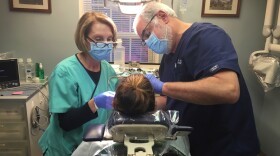
Elana Gordon
Elana Gordon covers the health beat at KCUR. She was previously a production assistant for KCURâ
-
In some countries, doctors prescribe medical-grade heroin to patients with long-term addiction. Could it ever happen the U.S.? A new report from RAND Corporation outlines the pros and cons.
-
Proposals in several cities to offer drug users access to a safe space to consume drugs have caused a political stir, but what do we really know about the effectiveness of safe injection sites?
-
Disabled Americans working in medicine are speaking up about their role in the profession. Not only can they perform the work of doctors, but they offer a level of empathy others may lack.
-
Infections from intravenous drug use are often hidden, under sleeves and beneath pants. These wounds of addiction may be buried in shame. They can also be serious, requiring surgery or constant care.
-
Philadelphia officials gave the OK to establishing safe injection sites for drug users. But it's unclear where the sites would be located and who would fund and operate them.
-
Health insurer Aetna has reached a settlement with people whose privacy was compromised when their HIV status was visible through the clear address windows on envelopes sent to them.
-
Treatment for opioid addiction can be expensive and difficult to coordinate. That might make some people tempted to think they can overcome the addiction on their own. This rarely works.
-
Insurers and politicians struggle constantly to thread the needle between making sure people have good health insurance and figuring out who should pay, especially for those who need a lot of care.
-
A medical residency program is the next training step for newly minted doctors, and awaiting "the match" can be tense. For some international students, Trump's travel ban has made that tension worse.
-
After minor surgeries, many dentists used to reflexively prescribe quick-acting opioids to relieve a patient's pain. Now they're learning to counsel patients about better, less addictive alternatives.










